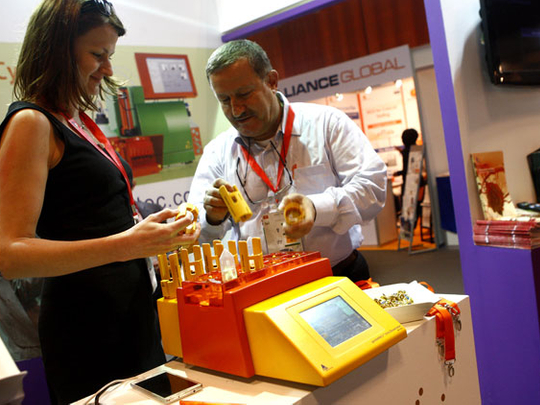
Dubai: While the UAE has made pre-marital genetic counselling mandatory for Emirati men and women to bring down the incidence of genetic diseases, pre-implantation genetic diagnosis (PGD) will be the next step in effectively eliminating the top five genetic diseases in the UAE, said Dr Allan Thornhill, a reproductive geneticist at the fifth International Genetic Diseases conference which started in Dubai on Sunday.
PGD is a technique used to identify genetic defects in embryos created through in vitro fertilisation (IVF) before pregnancy.
Talking to Gulf News on the sideline of the conference, Dr Thornhill said: “Right now carrier screening is widespread in the Middle East region, including the UAE, which means young men and women get themselves screened for genetic mutations. But PGD works in the case of known inherited genetic diagnosis. During IVF, parents with known genetic mutations can ensure that only healthy embryos are implanted. This is a practice that is ethically acceptable in the region,” he said.
According to health specialists, the top five genetic diseases in the UAE are thalassemia, sickle cell anaemia, haemophilia, G6PD deficiency and cystic fibrosis, the incidence of which can be dramatically controlled with PGD. So far premarital genetic counselling has been successful in effectively bringing down the incidence of thalassemia in the UAE and stricter screening protocols could help cut back the widespread incidence of genetic diseases.
Elaborating on the technique, Dr Nishi Singh, chair of health sciences at the Dubai Higher Colleges of Technology for women, said : “PGD is a foolproof method to ensure elimination of a particular genetic disorder that the parents might be carriers of. When this screening is carried out, the tainted embryos are discarded and only healthy embryos are implanted. The chances of successful pregnancies through IVF remain at 40-50 per cent. However, PGD is available at just three to four centres in the UAE. The procedure is expensive and perhaps subsidies to national couples will help encourage them to go for PGD as this is the way forward to eliminate genetic diseases from society,” she said.
The four-day international conference launched under the patronage of Shaikh Nahyan Bin Mubarak Al Nahyan, Minister of Culture, Youth and Community Development and president of the UAE Genetic Diseases Association(UAEGDA), will see participation from 32 countries.
Commenting on the scale and reach of the conference Dr Mariam Mattar, chairman of the UAE genetic disease association, said: “We need such conferences to reach the optimal preventive standards from genetic diseases.”
In addition, she said, it will help cast light on the successful experiences and best practices in developed countries concerning genetic and inherited diseases.
Dr Mariam added that the four-day-conference would extend its umbrella to involve new collaboration from Saudi Arabia via the first conference of the Middle East molecular biology association and other partnerships and societal initiatives that are in line with UAE GDA objectives to raise awareness and prevention of genetic diseases.











